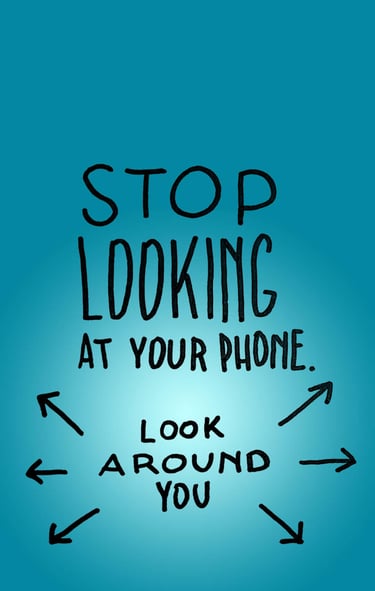Why Can't You Put Your Phone Down at Night? The Neuroscience of Nighttime Scrolling
Can't stop scrolling before bed? Discover the powerful neuroscience and psychology behind nighttime scrolling, from dopamine loops to melatonin disruption. Learn how your phone's blue light and endless feed hijack your brain, ruin your sleep quality, and what you can do tonight to break the cycle and reclaim your rest. This isn't just a bad habit—it's your brain being tricked. Here's why scrolling before bed is so hard to resist and what you can do about it.
SOCIAL


You’ve done it a hundred times. You get into bed, plug your phone in, and tell yourself, "Just five minutes." The next thing you know, 45 minutes have vanished down a vortex of TikTok videos, Instagram Reels, and endless news feeds. You finally put the phone down, but your mind is racing, and sleep feels miles away.
This isn't a simple lack of willpower. It’s a calculated assault on your brain's biology by apps and platforms designed to be irresistible. Understanding the powerful neuroscience and psychology behind this habit is the first step to breaking free. Let's dive into the five key mechanisms that keep you glued to your screen long after you should be asleep.
1. The Dopamine Loop: Your Brain on a Slot Machine
At the core of nighttime scrolling addiction is a powerful neurotransmitter: dopamine. Often mislabeled as the "pleasure chemical," dopamine is more accurately described as the "reward-seeking" or "anticipation" chemical. It’s what makes you feel motivated to pursue a goal.
Social media platforms are engineered to exploit this system mercilessly:
Variable Ratio Reinforcement: This is the same psychological principle that makes slot machines so addictive. You don't get a "win" (a like, a funny video, an interesting post) every time you pull the lever (scroll). The rewards are unpredictable. This unpredictability is far more compelling than a predictable reward. Your brain thinks, "The next scroll could be the best one!" so it keeps you searching.
The Architecture of Endlessness: The "infinite scroll" feature was deliberately created to remove any natural stopping point. There is no "The End" on social media. Autoplay does the same for video content, removing the conscious decision to start a new one. This design eliminates friction and allows you to enter a passive, trance-like state of consumption.
The Result: You’re not consciously choosing to watch one more video; your brain's primal reward system is being hijacked, pushing you to seek just one more hit of novelty.
2. Blue Light & Melatonin Suppression: Tricking Your Internal Clock
Your body runs on a 24-hour cycle known as the circadian rhythm, regulated by a master clock in your brain. The single most important external cue for this clock is light.
The Melatonin Shutdown: As the sun sets, your brain's pineal gland begins producing melatonin, the hormone that makes you feel drowsy and prepares your body for sleep. The blue light wavelengths emitted by smartphones, tablets, and laptops are exceptionally effective at mimicking daylight. When this light hits photoreceptors in your eyes, they send a signal straight to your brain: "It's daytime! Stay alert!"
The Myth of Night Mode: While "Night Shift" or "Blue Light Filter" settings on your phone are a step in the right direction, they are not a magic solution. They merely reduce the amount of blue light; they don't eliminate it. Furthermore, the mental engagement and stimulation from the content itself are often more disruptive than the light alone. A 2018 study from the University of Manchester found that yellow light might actually be more disruptive to sleep than blue light in mice, suggesting the relationship is complex, but the consensus remains: darkness is best.
The Result: Even a short scrolling session can delay melatonin release by over an hour, pushing your entire sleep schedule back and resulting in less restorative deep sleep and REM sleep, even if you get a full eight hours.
3. Cortisol and Hyper-Arousal: From Relaxation to Alertness
Bedtime should be for winding down. But the content you consume can trigger a stress response that is biologically antithetical to sleep.
The Fight-or-Flight Response: Engaging with stressful news, political arguments, work emails, or even intensely dramatic content can trigger the release of cortisol and adrenaline. These hormones increase your heart rate, blood pressure, and alertness—preparing your body to face a threat. Your body can't tell the difference between a real-life crisis and a stressful Twitter thread; the physiological response is similar.
The Cognitive Load: Scrolling isn't passive. Your brain is actively processing a rapid-fire stream of information: new faces, jokes, opinions, and narratives. This high cognitive load prevents your mind from entering the quiet, drifting state necessary for sleep onset. It's like slamming the mental brakes after driving on the information superhighway.
The Result: You put down the phone but your mind is still processing, worrying, and analyzing. This state of cognitive and physiological hyper-arousal is a primary driver of insomnia.
4. Decision Fatigue and the "Just One More" Trap
Willpower is a finite resource. Throughout the day, you make thousands of decisions, depleting your mental energy—a phenomenon known as decision fatigue.
Depleted Reserves: By the time you get to bed, your ability to make good decisions and exert self-control is at its lowest ebb. This makes it incredibly difficult to resist the impulsive, "easy" choice of continuing to scroll. The part of your brain responsible for executive function (the prefrontal cortex) is tired, and the primal, reward-seeking parts take over.
The Sunk Cost Fallacy: This cognitive bias makes us continue a behavior because we've already invested time or resources into it, even if it's no longer beneficial. "I've already been scrolling for 40 minutes, so what's another 10?" This irrational thought pattern keeps you trapped in the cycle long after the activity has ceased to be enjoyable.
5. FOMO (Fear Of Missing Out): The Anxiety of Disconnection
FOMO is the social anxiety that an exciting or important event may be happening elsewhere, often sparked by posts on social media. At night, this translates to: "If I go to sleep, I might miss something important, funny, or interesting."
The Reality Check: This fear is almost entirely irrational. Truly urgent information will reach you through a phone call or text message. The curated highlights and updates on social media are not urgent. In fact, consuming them right before bed only serves to increase anxiety and social comparison, making you feel less connected and more inadequate.
JOMO (Joy Of Missing Out): The antidote to FOMO is embracing JOMO—the peace and satisfaction that comes from being present in your own life and disconnecting from the digital noise. Nothing on your feed is more valuable than a full night of deep, restorative sleep.
How to Reclaim Your Sleep: A Science-Backed Action Plan
Breaking this cycle requires more than willpower; it requires a strategic approach based on the very science that explains the addiction.
1. Create a "Digital Sunset": Institute a strict screen cutoff time 60 minutes before bed. This is non-negotiable. This allows your melatonin levels to rise naturally and your nervous system to begin calming down.
2. Change Your Charging Routine: Charge your phone outside of the bedroom. This is the single most effective change you can make. If you use your phone as an alarm clock, buy a cheap dedicated alarm clock. This removes the temptation entirely.
3. Curate Your Wind-Down Routine: Replace scrolling with genuinely relaxing activities that don't involve a screen:
Read a physical book. (We highly recommend Matthew Walker's incredible book, Why We Sleep, for a deep dive into the science of sleep and its profound importance.)
Listen to calming music, a boring podcast, or a sleep story.
Practice light stretching or yoga.
Write in a journal to dump your thoughts onto paper and out of your head.
Drink a non-caffeinated herbal tea like chamomile.
4. Use Technology to Fight Technology: Leverage app blockers and phone settings to build friction:
Use "Do Not Disturb" and "Sleep Focus" modes to silence all non-essential notifications.
Enable grayscale mode on your phone in the evening. Removing color makes apps dramatically less stimulating and appealing.
Use apps like Freedom, Stay-Focusd, or built-in Screen Time settings to block social media apps entirely after a certain time.
